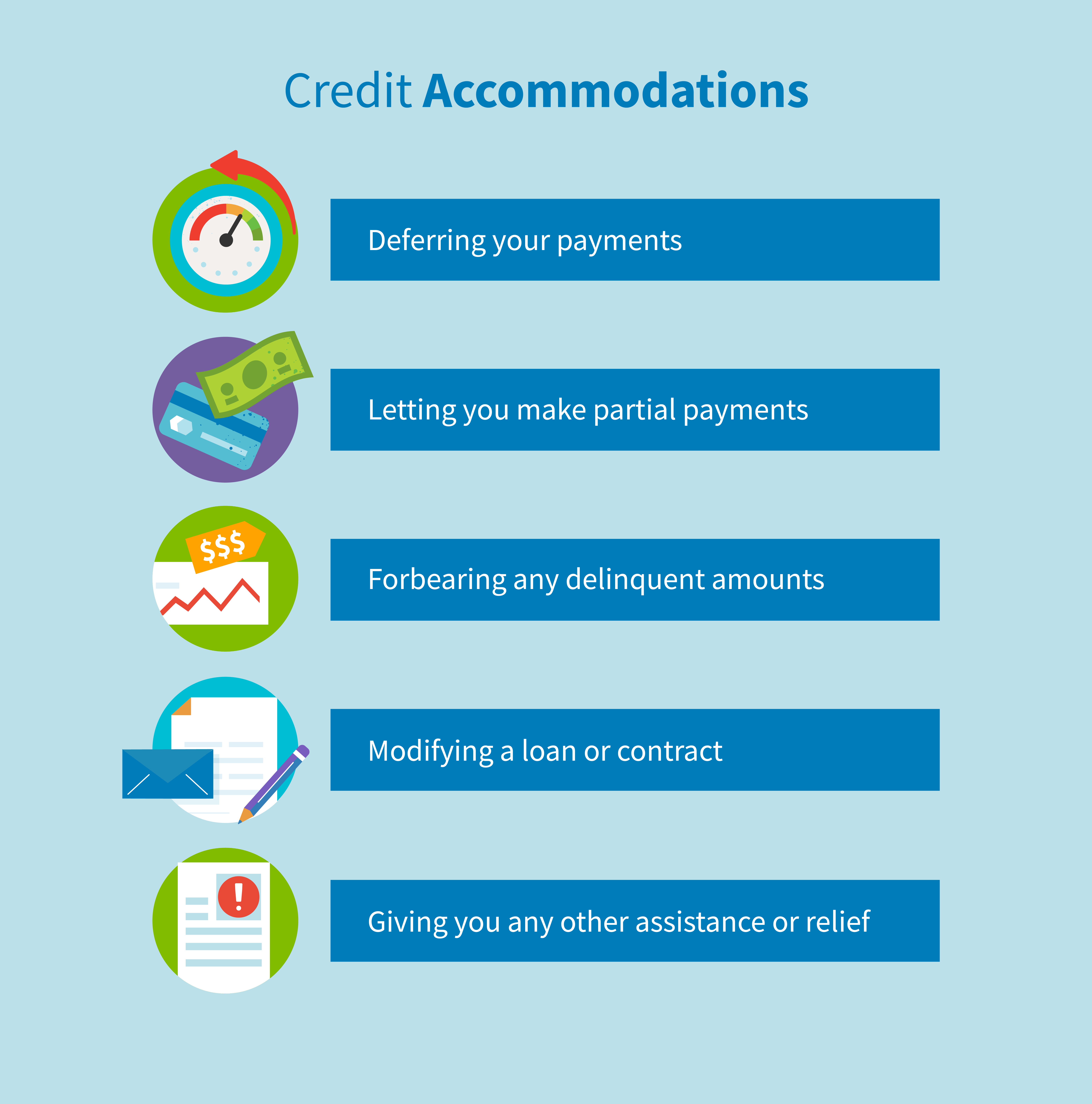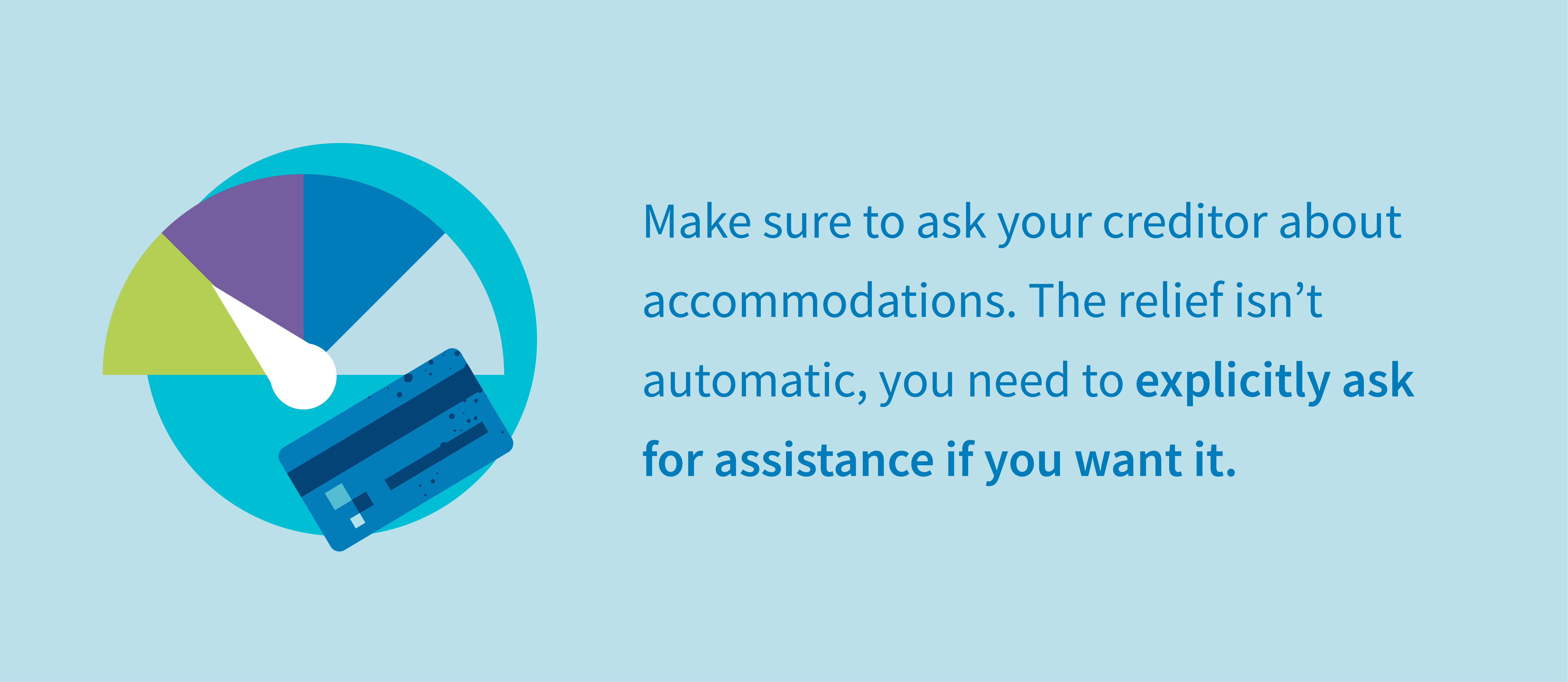
The 2020 Coronavirus Aid, Relief and Economic Security (CARES) Act provides, among other things, a number of credit protections for consumers to help them financially survive the coronavirus (COVID-19) pandemic. Information in the CARES Act can be hard to understand, so we’re breaking it down for you here, from credit reporting changes to credit accommodations and more.
What Is Reported to the Credit Bureaus?
The law doesn’t require lenders to report anything, but there are many pieces of information that lenders do typically report. This includes items like the following.
- Payment history
- Loans and loan terms
- Balances owed
- Account closures
- Credit limits
In addition, things that appear in public records, like bankruptcies, usually show up on credit reports—even if they are not explicitly reported by governmental agencies.
All of these items have the potential to both positively and negatively affect your credit score, which lenders will use to determine whether or not to extend credit to you. So it’s very important for you to be aware of what information is showing up on your credit report.
Adjustments to Negative Credit Reporting
As of March 27, 2020, negative credit reporting works a little differently. The CARES Act modifies the Fair Credit Reporting Act (FCRA) so that if you receive an accommodation for a loan due to coronavirus-related hardship and you were current on the loan prior to the accommodation, your creditor must continue to report your account as being current. This will help you protect your credit score from prominent negative items.
Note that if your account was delinquent before the changes, it will remain delinquent unless you catch up on your payments. The CARES Act does not eliminate any preexisting items. You can still seek some kind of debt relief during this time, though.
What Are Credit Accommodations?
Credit accommodations in the context of the CARES Act are loan modifications that your creditor can agree to grant you. These things are specifically listed:
- Deferring your payments
- Letting you make partial payments
- Forbearing any delinquent amounts
- Modifying a loan or contract
- Giving you any other assistance or relief
Whichever accommodation(s) you’re given, it’s important that you uphold your end of the deal with regard to making payments. Always get a written copy of the agreement so you know what your obligations and the lender’s obligations are. Doing so is one of the best ways to ensure that your credit is affected as little as possible by your financial troubles.

Do I Qualify for Credit Accommodations?
Only your lender can make the qualification; however, many lenders are making programs available. You’re likely to qualify for credit accommodations if you’re a) a borrower and b) financially impacted by COVID-19, whether that’s due to a job loss, rising medical bills or something else. Contact your lender as soon as you realize you are having trouble meeting your financial obligations.
An important part of the text in the CARES Act is that the accommodation must be by agreement. This means that you need to discuss your specific circumstances with your lender and together decide on an arrangement that works; you should not stop making payments or make different payments without taking this step first.
Such wording emphasizes the fact that this statute does not automatically block all negative reporting, which other proposals attempted to do.
There were conflicting opinions on this, as certain members of the finance industry worried that this would ultimately hurt consumers more in the long run by weakening the accuracy of everyone’s credit scores. For now, borrowers have to rely on the provisions in the CARES Act and be proactive in caring for their financial health.
For now, borrowers have to rely on the provisions in the CARES Act and be proactive in caring for their financial health.
How to Negotiate with Your Creditor
Now more than ever, you need to know how to advocate for yourself and work with your creditors. Here are some things you can do, in many different situations, when negotiating with a lender:
- Ask about accommodations. Since the relief isn’t automatic, you need to explicitly ask for assistance if you want it.
- Document all agreements and terms. Keep a proper record of everything, just in case.
- Have a natural disaster code added to your credit report. If you can’t receive sufficient accommodations, this would be the next best thing. This code would indicate to potential creditors that you were affected by a declared or natural disaster.
- Use pay for delete letters if necessary. These letters can help you when you want to remove certain negative items, like charge-offs and late payments, from your credit report.
- Challenge any preexisting negative items that you believe are inaccurate. You can do this in many ways, such as by using a 609 Dispute Letter.
- Above all, be honest and up-front. This will ensure that your creditors have as much accurate information as possible when considering if they will help you and how they can do so.

Is There a Limited Timeframe for Credit Relief?
According to the Consumer Financial Protection Bureau (CFPB), the CARES Act provisions regarding credit reporting apply only to agreements made within a certain timeframe: between January 31, 2020, and either 120 days after March 27, 2020, or 120 days after the national emergency concerning COVID–19 ends, whichever happens later.
This deadline means that you shouldn’t wait to get in touch with your lender to discuss credit relief during this national crisis. As soon as you think you need assistance—or if you need it already—contact your loan servicers and creditors to find out about your options and guard your finances.
You can also reach out to credit consultants to learn more about things like what shows up on your credit report and what resources are available to help you keep on top of your overall credit health.



